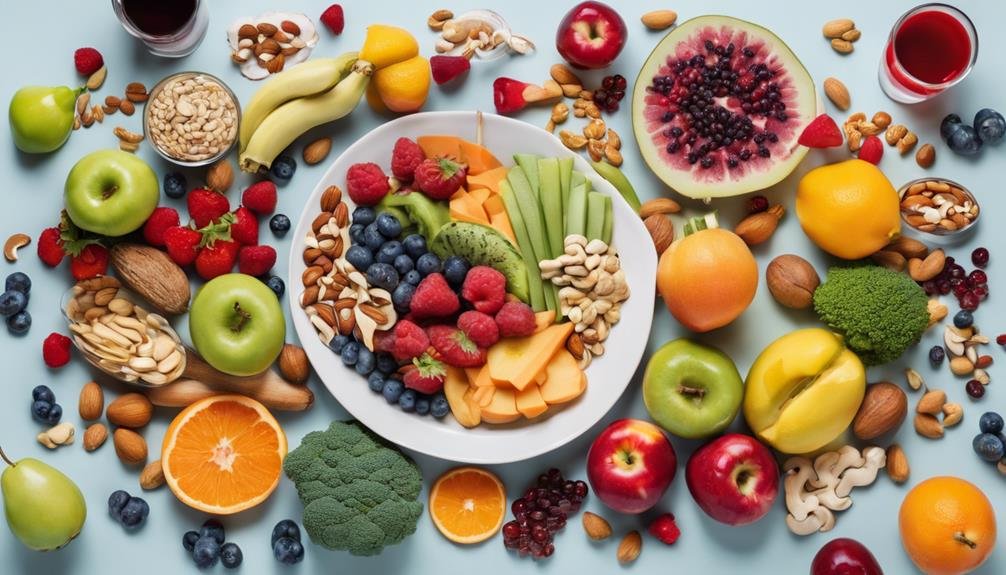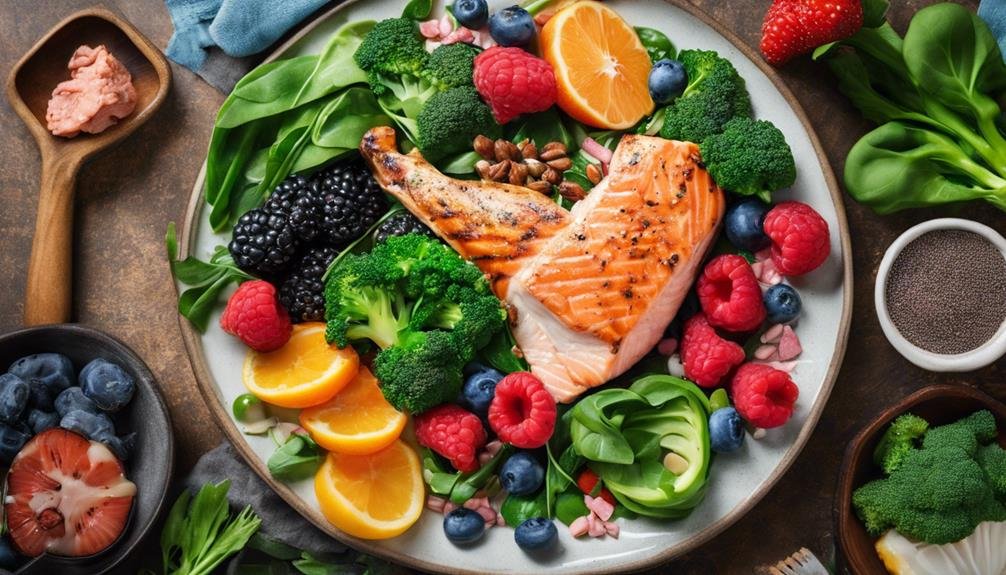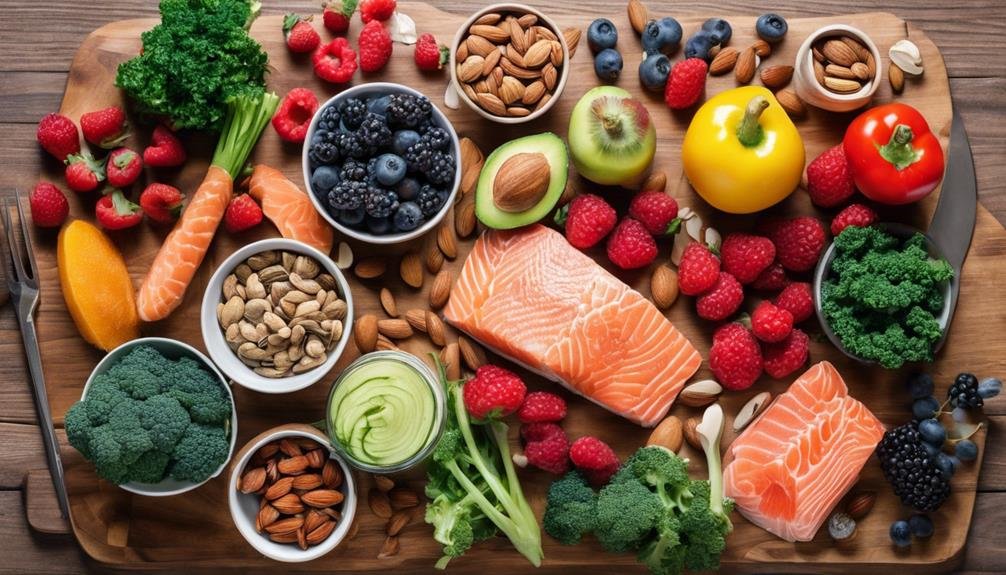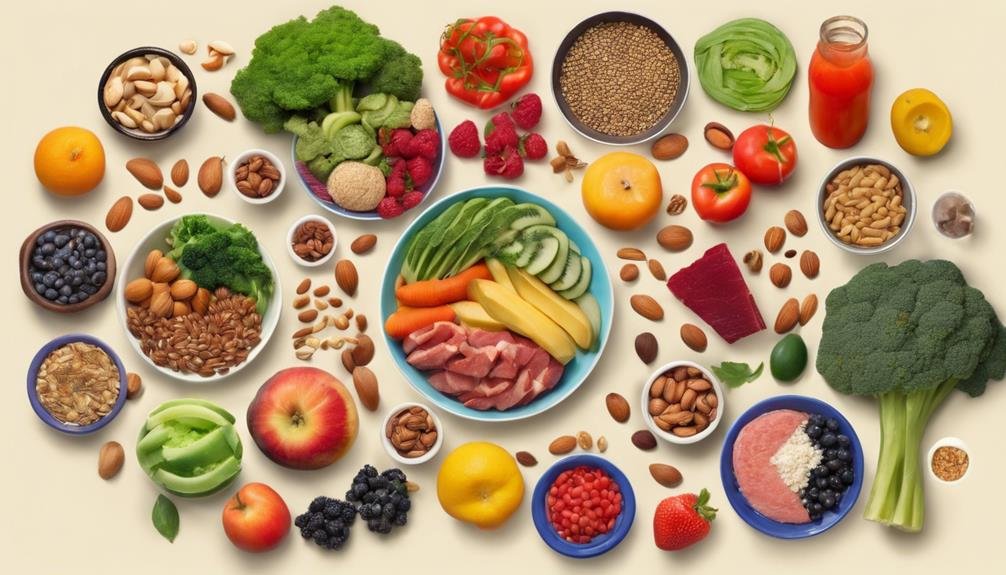Exploring the potential impact of the Paleo diet on tumor growth can lead to intriguing insights. Consider how the dietary choices you make could influence the environment in your body and potentially affect tumor development. The relationship between nutrition and cancer is complex, and understanding how a diet like Paleo may play a role in this connection is an ongoing area of research worth pondering.
What Is the Paleo Diet?
The Paleo Diet, short for Paleolithic Diet, is a nutritional approach that aims to mimic the dietary habits of our ancient ancestors. This diet primarily consists of lean proteins, fruits, vegetables, nuts, and seeds while excluding processed foods, grains, dairy, and sugars. By focusing on whole foods that our ancestors consumed during the Paleolithic era, the diet aims to improve overall health and well-being.
One of the key principles of the Paleo Diet is to consume foods that are high in nutrients and free from additives and preservatives. This approach aims to support optimal functioning of the body and promote overall health.
Understanding Tumor Growth
Understanding how tumors grow is crucial in the field of oncology. Tumor growth is a complex process involving the uncontrolled division of abnormal cells. These cells can evade the body's natural defense mechanisms, proliferate rapidly, and form a mass of tissue known as a tumor.
Tumors can be benign or malignant, with malignant tumors having the potential to invade surrounding tissues and spread to distant organs through a process called metastasis.
The growth of tumors is influenced by various factors, including genetic mutations, environmental exposures, and inflammatory processes within the body. Cancer cells acquire mutations that allow them to grow uncontrollably, resist cell death signals, and promote angiogenesis – the formation of new blood vessels to supply nutrients and oxygen to the tumor.
Understanding these mechanisms is essential for developing targeted therapies that can inhibit tumor growth and improve patient outcomes. By elucidating the intricate pathways involved in tumor growth, researchers can identify novel treatment strategies to combat cancer effectively.
The Link Between Diet and Cancer
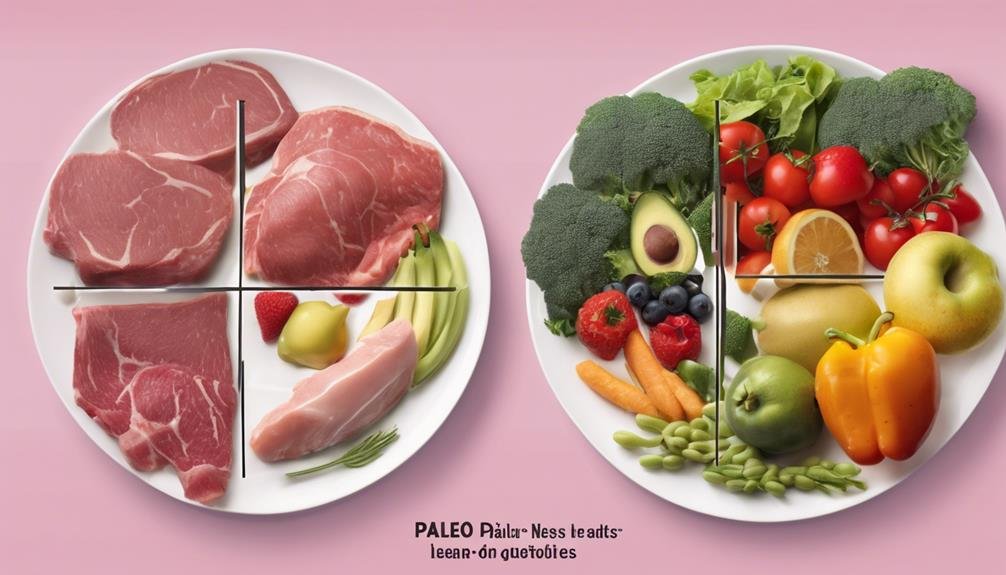
To grasp the full scope of cancer development, it's imperative to explore the intricate relationship between diet and tumorigenesis. Your dietary choices can significantly impact your risk of developing cancer. Research suggests that consuming a diet rich in fruits, vegetables, whole grains, and lean proteins can lower the risk of certain types of cancer. On the contrary, diets high in processed foods, saturated fats, and sugars have been linked to an increased risk of cancer development.
Several mechanisms underlie the link between diet and cancer. For instance, certain foods may contain antioxidants and phytochemicals that help protect cells from damage that can lead to cancer.
On the other hand, diets high in processed meats and additives may promote inflammation and oxidative stress, which are known to contribute to cancer development.
Paleo Diet and Inflammation
Incorporating the Paleo diet into your nutritional regimen can have a significant impact on inflammation levels within your body. Research suggests that this way of eating may help combat inflammation, a key factor in various chronic diseases. Here are five ways the Paleo diet can help reduce inflammation:
- Rich in Omega-3 Fatty Acids: The diet promotes consumption of foods like fatty fish and nuts, which are high in anti-inflammatory omega-3 fatty acids.
- High in Antioxidants: Fruits and vegetables included in the Paleo diet are rich in antioxidants that help combat oxidative stress and reduce inflammation.
- Low in Processed Foods: By eliminating processed foods and sugars, the diet helps reduce inflammation triggered by these substances.
- Balanced Omega-6 to Omega-3 Ratio: The Paleo diet emphasizes a balanced intake of omega-6 and omega-3 fatty acids, which can help reduce inflammation levels.
- Promotes Gut Health: By encouraging the consumption of fiber-rich foods and eliminating processed ingredients, the diet supports a healthy gut microbiome, which plays a crucial role in reducing inflammation.
Impact on Insulin Levels
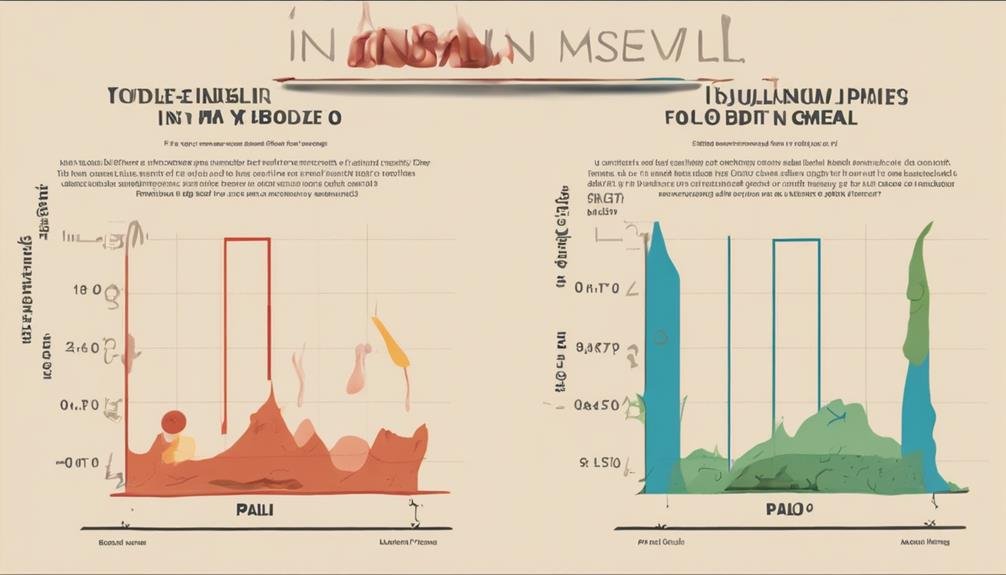
Having discussed how the Paleo diet can positively impact inflammation levels in the body, it's important to explore its effects on insulin levels.
The Paleo diet, rich in whole foods like lean meats, fruits, vegetables, nuts, and seeds, has been shown to have a notable impact on insulin sensitivity. By avoiding processed foods and refined sugars, the diet helps regulate blood sugar levels, reducing the risk of insulin spikes and crashes. This stabilization of insulin levels is crucial in preventing insulin resistance, a condition linked to various health issues, including cancer growth.
Research suggests that following a Paleo diet may lead to improved insulin sensitivity, potentially reducing the risk of developing tumors or slowing down tumor growth. By promoting a balanced insulin response, this dietary approach may create an environment less conducive to tumor development.
Additionally, the emphasis on nutrient-dense foods in the Paleo diet supports overall health and well-being, further contributing to potential cancer prevention.
Role of Nutrient Density
During dietary interventions, the role of nutrient density plays a crucial part in determining overall health outcomes. Ensuring that your diet is rich in essential nutrients is key to supporting your body's functions and possibly aiding in reducing tumor growth. Consider the following points to understand the significance of nutrient density:
- Nutrient-dense foods provide a higher concentration of vitamins and minerals per calorie, offering more health benefits.
- These foods can help optimize your immune system, potentially enhancing its ability to detect and fight abnormal cells.
- Adequate nutrient intake supports proper cellular function and repair mechanisms, which are crucial in preventing uncontrolled cell growth.
- Nutrient-dense foods often have anti-inflammatory properties, which can help create an environment less conducive to tumor development.
- Consuming a variety of nutrient-dense foods ensures that your body receives a broad spectrum of essential nutrients necessary for overall health and potential tumor suppression.
Potential Anti-Cancer Properties
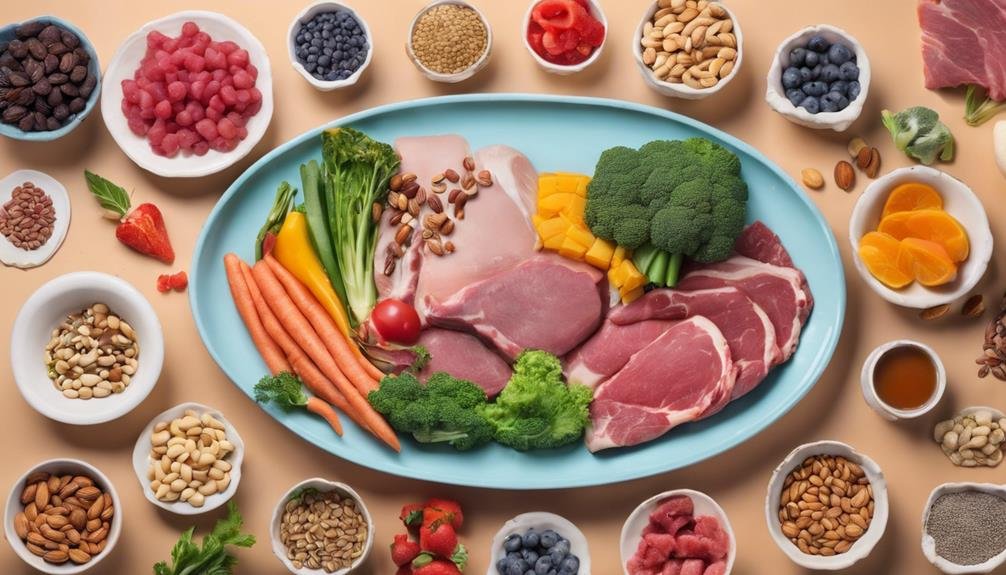
Numerous studies have highlighted the potential anti-cancer properties of certain foods and dietary patterns. Foods rich in antioxidants, such as fruits, vegetables, nuts, and seeds, have been shown to help reduce oxidative stress and inflammation, which are key factors in cancer development.
For example, berries contain compounds like anthocyanins that have been linked to lower cancer risk. Cruciferous vegetables like broccoli and kale are known for their anti-cancer effects due to compounds like sulforaphane.
Moreover, the Paleo diet emphasizes the consumption of whole foods that are free from additives, preservatives, and refined sugars, which can contribute to cancer growth. By focusing on nutrient-dense foods that support overall health and well-being, the Paleo diet may help reduce the risk of cancer by providing the body with essential vitamins, minerals, and phytonutrients that support a healthy immune system and combat cancer cell growth.
Studies on Tumor Reduction
Research studies have demonstrated the potential of the Paleo diet in reducing tumor growth in various types of cancer. The findings indicate promising outcomes in the realm of oncology, suggesting that dietary interventions can play a significant role in cancer management and treatment. Here are some key insights to consider:
- Inhibition of Tumor Progression: The Paleo diet has shown to impede the growth and spread of tumors in preclinical studies.
- Enhanced Immune Response: By promoting a healthy immune system, the Paleo diet may aid in the body's natural defense mechanisms against cancer cells.
- Reduced Inflammation: Chronic inflammation is a known factor in cancer development; the anti-inflammatory properties of the Paleo diet could help mitigate this risk.
- Balanced Hormone Levels: Hormonal imbalances can contribute to certain types of cancer; the Paleo diet's focus on whole foods may help regulate hormone levels.
- Improved Nutrient Absorption: Proper nutrition is crucial for overall health and may support the body in fighting cancer cells more effectively.
Paleo Diet and Metabolic Health
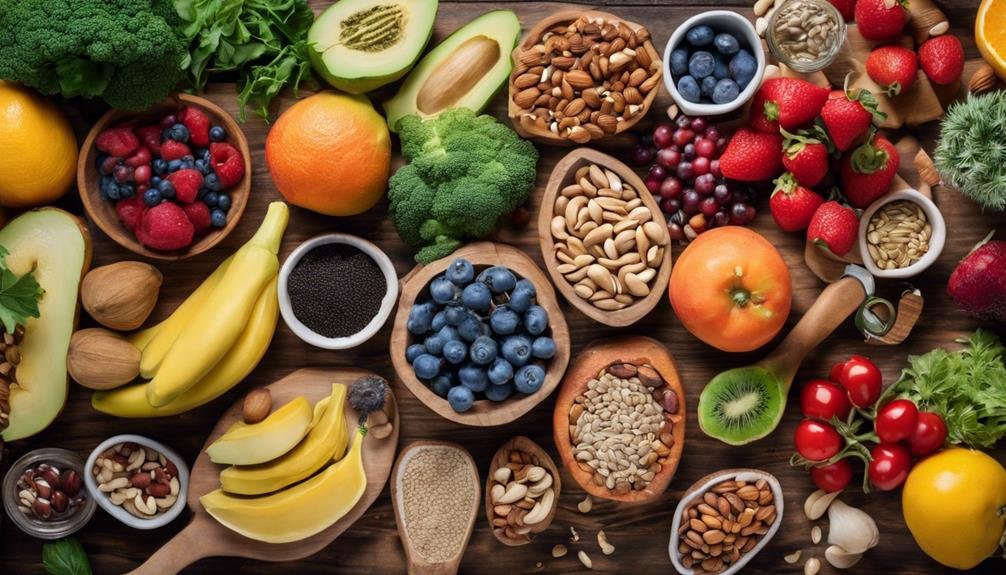
A significant aspect of the Paleo diet revolves around its impact on metabolic health. By focusing on whole foods like lean meats, fish, fruits, vegetables, nuts, and seeds while avoiding processed foods, added sugars, and grains, the Paleo diet can positively influence metabolic markers. Research suggests that following a Paleo diet may improve insulin sensitivity, reduce inflammation, and aid in weight management. These factors are crucial for maintaining a healthy metabolic profile.
Moreover, the emphasis on high-quality proteins and healthy fats in the Paleo diet can help regulate blood sugar levels and support optimal metabolic function. Studies have shown that this dietary approach may lead to better control of blood glucose levels and lipid profiles, which are key components of metabolic health. By promoting nutrient-dense, unprocessed foods, the Paleo diet offers a foundation for supporting overall metabolic well-being.
Incorporating the Paleo diet into your lifestyle may provide benefits beyond weight management, such as enhancing metabolic health and reducing the risk of metabolic disorders. Making informed dietary choices can play a significant role in supporting your overall well-being.
Considerations for Cancer Patients
When facing cancer, dietary considerations play a crucial role in supporting your overall health and well-being. As a cancer patient, it's important to carefully consider your diet to optimize your body's ability to fight the disease and maintain overall wellness.
Here are some key considerations for cancer patients:
- Nutrient-Dense Foods: Focus on consuming a variety of nutrient-dense foods to support your immune system and overall health.
- Hydration: Stay well-hydrated to help your body function optimally and support various physiological processes.
- Protein Intake: Adequate protein intake is essential for maintaining muscle mass and supporting healing processes.
- Fiber-Rich Foods: Incorporating fiber-rich foods can aid in digestion and promoting gut health during cancer treatment.
- Individualized Approach: Work with a healthcare provider or dietitian to tailor your diet to your specific needs and treatment plan.
Implementing a Paleo Lifestyle

Considering the impact of diet on cancer treatment outcomes, exploring alternative dietary approaches like the Paleo lifestyle can offer potential benefits. The Paleo diet emphasizes whole foods such as lean proteins, fruits, vegetables, nuts, and seeds while excluding processed foods, grains, dairy, and sugar.
When implementing a Paleo lifestyle, focus on consuming grass-fed meats, wild-caught fish, organic produce, and healthy fats like avocado and olive oil. These nutrient-dense foods provide essential vitamins, minerals, and antioxidants that support overall health and may help reduce inflammation, a key factor in tumor growth.
Incorporating the Paleo lifestyle involves meal planning, label reading, and food preparation to ensure adherence to the diet. It's essential to consult with a healthcare provider or a registered dietitian before making significant dietary changes, especially during cancer treatment.
They can provide guidance on how to tailor the Paleo diet to meet individual nutritional needs while ensuring adequate caloric intake to support healing and recovery. By implementing a Paleo lifestyle thoughtfully and with expert guidance, you may potentially support your body's ability to fight against tumor growth and improve overall well-being.
Future Research Directions
Exploring the future research directions in the field of cancer treatment and dietary interventions opens up avenues for understanding the potential impact of the Paleo diet on tumor growth. As researchers delve deeper into this area, several key areas warrant investigation:
- Long-term Effects: Examining the sustained effects of the Paleo diet on tumor progression over extended periods.
- Mechanistic Studies: Conducting in-depth studies to elucidate the specific mechanisms through which the Paleo diet may influence tumor growth.
- Clinical Trials: Initiating large-scale clinical trials to assess the efficacy of the Paleo diet as an adjuvant therapy for cancer patients.
- Population Studies: Analyzing data from diverse populations to determine the generalizability of the potential benefits of the Paleo diet in reducing tumor growth.
- Combination Therapies: Investigating the synergistic effects of combining the Paleo diet with conventional cancer treatments for enhanced outcomes.
Frequently Asked Questions
Can the Paleo Diet Completely Cure Cancer?
The Paleo diet alone can't completely cure cancer. While some studies suggest a link between diet and cancer prevention, the impact of diet on established cancer is limited. Cancer treatment typically requires a combination of surgery, chemotherapy, radiation, and other therapies. It's essential to follow medical advice and treatment plans prescribed by healthcare professionals to effectively manage cancer.
Dietary changes like adopting a Paleo diet can support overall health but aren't a standalone cancer cure.
Are All Types of Tumors Affected by the Paleo Diet?
When it comes to the impact of the Paleo diet on tumors, it's essential to note that different types of tumors may respond in varied ways. The Paleo diet's emphasis on whole foods, low sugar, and healthy fats could potentially influence tumor growth through improved metabolic health and reduced inflammation. However, the specific effects on different tumor types require further research to confirm the diet's comprehensive impact on tumor growth.
How Soon Can the Paleo Diet Show Effects on Tumor Growth?
For a thorough understanding of how soon the Paleo diet can show effects on tumor growth, consider consulting with a healthcare provider or a nutrition specialist. They can offer personalized guidance based on your specific health needs and circumstances. Monitoring changes in tumor growth typically involves regular medical assessments and imaging studies to track progress. Be sure to follow recommended dietary guidelines and treatment plans for optimal results.
Can the Paleo Diet Prevent Cancer From Developing?
The Paleo diet emphasizes whole foods, lean proteins, and healthy fats, which may help reduce inflammation and oxidative stress in the body.
While no diet can guarantee prevention of cancer, adopting a Paleo lifestyle may support overall health and potentially reduce cancer risk through weight management and nutrient-dense food choices.
Is the Paleo Diet Suitable for All Cancer Patients Undergoing Treatment?
Is the Paleo Diet suitable for all cancer patients undergoing treatment?
The Paleo Diet, focusing on whole foods and limiting processed ones, may benefit cancer patients. However, individual health conditions and treatment side effects vary. Consult a healthcare provider or registered dietitian to tailor dietary recommendations to your specific needs. Monitoring weight, nutrient intake, and overall health is crucial during cancer treatment. Prioritize balanced nutrition to support your body's recovery.
Conclusion
In conclusion, the Paleo diet shows promise in potentially reducing tumor growth by promoting anti-inflammatory effects, regulating insulin levels, and improving metabolic health. As research continues to explore the link between diet and cancer, incorporating a Paleo lifestyle may offer benefits in cancer prevention and treatment. Embrace the power of whole foods, balanced hormones, and essential nutrients to create an environment less conducive to tumor progression. The Paleo diet may be a valuable tool in the fight against cancer.
